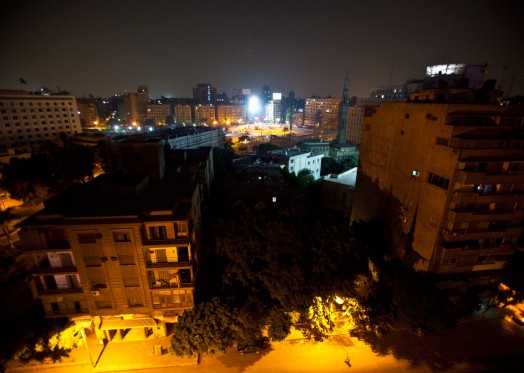Crackdown in Cairo

Two days after the bloodshed the army has conquered the city. Tanks and armored vehicles surround the mosques and the public buildings, line up in the streets, roll down the Nile corniche. Mobile check points appear and vanish. Soldiers in combat gear watch from the rooftops while plaincloth policemen manning pistols and machine guns check documents and keep the press at bay. A curfew is enforced at 7 pm. The state tv broadcasts General Abdul Fattah al-Sisi speech: “We will not stand by silently watching the destruction of the country” says the new Sphynx. And the government wants to ban the Brotherhood. Sure enough democracy will have to wait in Egypt. From my hotel balcony I look down to a deserted Tahrir square: there are still a few white tents in the roundabout, no one in sight and the distant sound of gunshots in the air. Magdi, my stringer, is on the phone with a report of 36 people killed some three hours ago when members of the Muslim Brotherhood tried to escape during their transfer to a prison on the outskirts of Cairo. We are back to Mubarak’s time, with the army on the ground, the generals in charge and the islamists going underground. So much for the “twitter revolution” and the arab spring, which never was.
I didn’t share the western enthusiasm for the so called Middle East “awakening” from the beginning: Iraq and Afghanistan taught me to be skeptical. Democracy – we all know – needs time to take root: there is no quick fix. So what? a friend told me, are you advocating some sort of autocracy? I was a bit uneasy in my view, until I felt vindicated reading an article by Charles Kupchan, professor of international affairs at Georgetown University, on yesterday’s IHT. “The penchant for rushing transitional states to the ballot box” he writes “often does more harm than good, producing dysfunctional and illiberal regimes. Egypt’s recently deposed president, Mohamed Morsi, may have been fairly elected, but he presided over the near collapse of the Egyptian state and ran roughshod over his political opponents”. And more: “Transitions to democracy in the Middle East will be more perilous than those elsewhere because of factors unique to the region: the power of political islam and the entrenched nature of sectarian and tribal loyalties…Islamic tradition makes no distinction between mosque and state, helping Islamists win elections. The result is a debilitating struggle between empowered Islamists and fractured secularists that is playing out in Egypt, Turkey, Tunisia and just about everywhere else”. Also, the number one promoter of Middle East democracy, the US, lacks credibility: “Its closest allies in the Arab world, the Gulf sheikdoms, are the region’s least democratic states. And when Hamas won the Palestinian elections in 2006, America sought to undermine the new government”.
Update: 24 policemen executed by presumed jihadists close to the Rafah-Gaza crossing in the Sinai. It’s a long bloody winding road to democracy in the Middle East.





